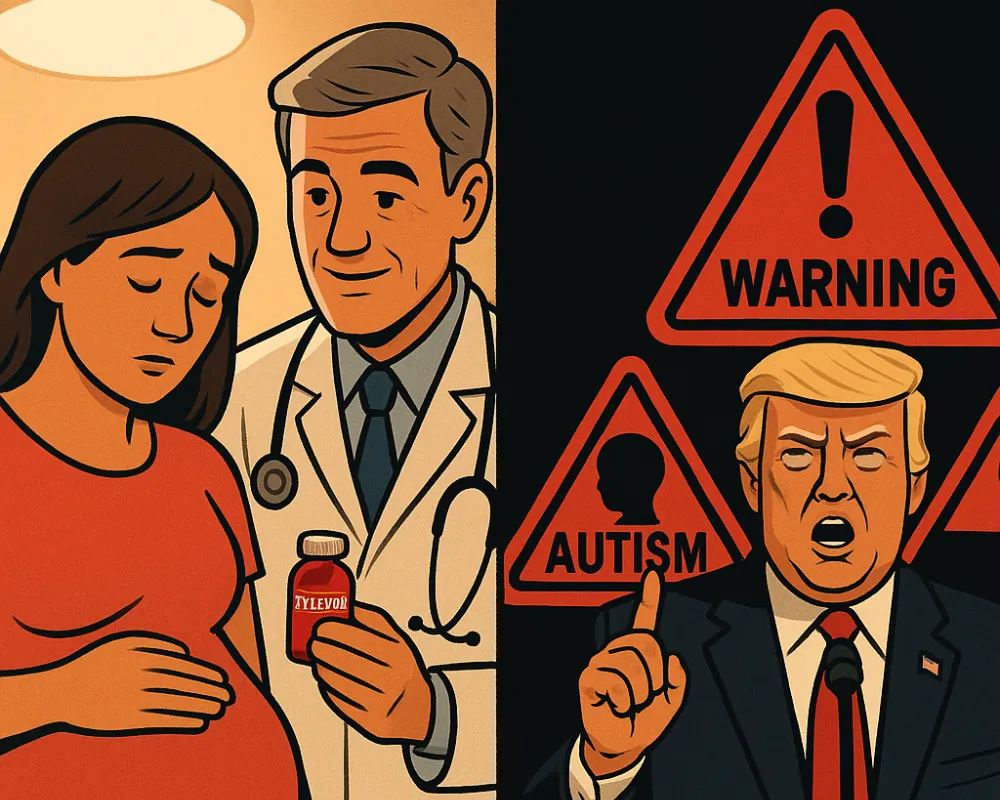Trump links paracetamol to autism. WHO, FDA, EMA reject claim, affirm pregnancy safety. Studies show no proven link, acetaminophen remains safe.
 Brajesh Mishra
Brajesh Mishra

President Donald Trump shocked the medical community by announcing that the U.S. Food and Drug Administration (FDA) would warn doctors about a possible link between acetaminophen (paracetamol/Tylenol) use during pregnancy and autism in children. Standing alongside Health Secretary Robert F. Kennedy Jr., Trump described the drug as “a very big factor” in autism and urged pregnant women to avoid it unless absolutely necessary.
The FDA confirmed it has begun a label change process for acetaminophen products and is reviewing data on potential neurological risks. At the same event, the administration announced plans to approve leucovorin (folinic acid) as a treatment option for some autism patients, with Medicaid coverage for low-income families.
But while the White House framed this as a breakthrough, the announcement has triggered intense scientific backlash worldwide.
Paracetamol is one of the most widely used medicines in pregnancy—taken by over half of pregnant women globally. It has long been recommended because alternatives like aspirin and ibuprofen carry known risks for fetal development.
Some studies have suggested a possible association between prenatal acetaminophen exposure and neurodevelopmental disorders such as autism and ADHD. A 2025 Harvard–Mount Sinai meta-analysis reviewing 46 studies found signals of increased risk.
However, causation has not been established. High-quality research—most notably a 2024 Swedish sibling study of 2.5 million children—found that when comparing siblings exposed and unexposed to the drug, the autism risk disappeared. This suggests genetics and maternal health factors are far more likely to explain the association.
Global regulators have firmly rejected Trump’s claims:
Australia’s Therapeutic Goods Administration (TGA) also reaffirmed: “Robust scientific evidence shows no causal link between paracetamol use in pregnancy and autism or ADHD.”
Doctors and advocacy groups have strongly criticized the administration’s stance:
Scientists warn that discouraging pregnant women from using acetaminophen could have serious unintended consequences.
Untreated fever and severe pain during pregnancy are themselves associated with higher risks of birth complications and autism. By casting doubt on the only safe over-the-counter pain relief option, health authorities fear women may be left without treatment—potentially putting both mother and child at greater risk.
As the Autism Science Foundation noted, many studies fail to account for why acetaminophen was taken in the first place—such as fever, which itself is a known autism risk factor.
Despite the White House announcement, the scientific consensus remains unchanged:
President Trump’s claim that paracetamol causes autism has sparked headlines, but global health authorities overwhelmingly disagree. For now, doctors stress that pregnant women should follow medical guidance—not political announcements—when managing pain and fever.
As WHO reminded in its statement: “The evidence remains inconsistent. Vaccines do not cause autism. Painkillers, when used correctly, do not cause autism. Science must guide public health.”






Sign up for the Daily newsletter to get your biggest stories, handpicked for you each day.
 Trending Now! in last 24hrs
Trending Now! in last 24hrs



